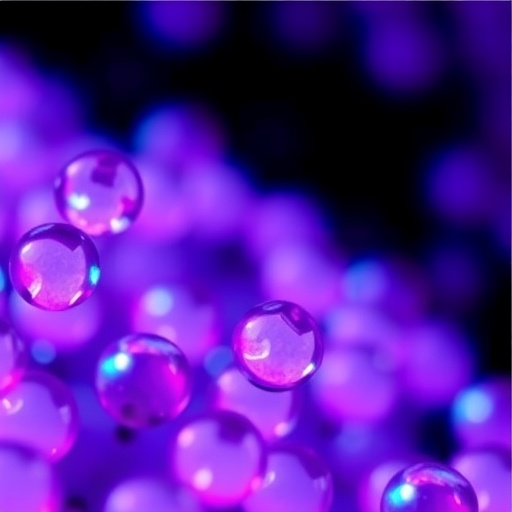In the relentless quest to uncover more effective and less toxic cancer therapies, a groundbreaking study has emerged from the efforts of Sadek, Hoseny, Fahmy, and colleagues, revealing the remarkable potential of pomegranate polysaccharides when delivered through nanoemulsion encapsulation. Published in the reputable journal Medical Oncology, this research provides compelling evidence for a novel therapeutic strategy that not only leverages the natural anti-tumor properties of pomegranate-derived compounds but also significantly enhances their efficacy against chemically induced colorectal cancer in rat models.
The tumor-promoting effects of 1,2-dimethylhydrazine (DMH), a potent carcinogen widely used to simulate human colon cancer, were the central focus of this investigation. DMH exerts its pathological impact primarily through the induction of oxidative stress and chronic inflammation, critical drivers of tumor initiation and progression. These processes disrupt cellular homeostasis, promote DNA damage, and foster a microenvironment conducive to metastasis. This study elucidates how nanoemulsion encapsulation can modify the pharmacokinetics and bioavailability of pomegranate polysaccharides, thereby amplifying their biological activities to counteract DMH-induced carcinogenesis.
Nanoemulsions, submicron-sized emulsified droplets, have gained prominence in drug delivery due to their high surface area, improved solubility of bioactive molecules, and enhanced permeability across biological membranes. By encapsulating the polysaccharides extracted from pomegranates within such nano-scale carriers, the researchers succeeded in protecting these therapeutic agents from premature degradation and ensured sustained release at the tumor site. This approach overcomes significant limitations related to the otherwise rapid metabolism and poor systemic distribution of polysaccharides when administered conventionally.
The potent antioxidant properties of pomegranate polysaccharides are well documented, with their ability to scavenge reactive oxygen species (ROS) playing a crucial role in mitigating oxidative damage. The novel nanoemulsion formulation demonstrated a pronounced suppression of oxidative stress markers in the colon tissues of treated rats, effectively reducing lipid peroxidation and restoring antioxidant enzyme activities. This stabilization of the redox balance is pivotal in preventing the initiation of mutations that can lead to carcinogenesis.
In addition to countering oxidative stress, the encapsulated polysaccharides markedly attenuated inflammatory responses elicited by DMH exposure. Chronic inflammation is a recognized hallmark of cancer, facilitating tumor growth and metastatic spread through the release of pro-inflammatory cytokines and chemokines. The nanoemulsion-encapsulated polysaccharides decreased the expression of key inflammatory mediators such as TNF-alpha and interleukins, thereby disrupting the tumor-promoting inflammatory cascade and curbing microenvironmental factors that favor malignancy.
Tumor metastasis, the primary cause of cancer-related mortality, poses a formidable challenge in clinical oncology. The study’s findings are particularly encouraging as the nanoemulsion delivery system not only suppressed primary tumor growth but also hindered the dissemination of tumor cells to distant organs. Histopathological analysis revealed a significant reduction in metastatic nodules in treated animals, highlighting the potential of this nanotechnological intervention to impede cancer progression at multiple stages.
The implications of this research are multifaceted. By harnessing the synergistic effects of natural bioactive compounds with advanced nanotechnology, this therapeutic approach offers a promising avenue for developing safer, more potent anti-cancer treatments. The biocompatibility and low toxicity profile of pomegranate polysaccharides, combined with the enhanced delivery efficiency conferred by nanoemulsions, could translate into improved patient outcomes and reduced side effects compared to conventional chemotherapeutics.
Furthermore, this study underscores the importance of targeting multiple oncogenic pathways simultaneously. The nanoemulsion encapsulation strategy enables a multifaceted attack by combining antioxidant, anti-inflammatory, and anti-metastatic mechanisms, which collectively create a hostile environment for tumor survival and progression. This pleiotropic effect is vital in addressing the complexity and heterogeneity of cancer biology.
From a translational perspective, the scalability and adaptability of nanoemulsion formulations hold significant promise for clinical applications. The relatively straightforward manufacturing processes ensure potential for rapid development and customization, paving the way for personalized medicine approaches. Additionally, the versatility of this platform may allow encapsulation of other phytochemicals or therapeutic agents, broadening the scope of nanomedicine in oncology.
The comprehensive in vivo evaluation presented in this study sets a strong foundation for future investigations to optimize dosage regimens, long-term safety, and efficacy in larger animal models and eventualmente in human clinical trials. Detailed mechanistic studies at the molecular level will further elucidate the pathways through which nanoemulsified polysaccharides exert their anti-cancer effects, guiding rational design of next-generation therapeutics.
Notably, this research highlights the critical role of natural products in drug discovery and development. Pomegranates, long revered for their medicinal properties, continue to inspire innovations that blend traditional knowledge with cutting-edge technology. The successful enhancement of their polysaccharide fraction’s therapeutic performance reaffirms the value of phytomedicine as a reservoir for novel anticancer agents.
As the global burden of colorectal cancer continues to rise, driven by lifestyle and environmental factors, new preventive and therapeutic strategies are urgently needed. The pioneering work of Sadek and colleagues offers a compelling blueprint for integrating nanotechnology with natural bioactive compounds to combat cancer more effectively. Their findings invigorate the prospect of using functional foods and nutraceuticals in oncologic care, supported by robust scientific validation.
In conclusion, the innovative study on nanoemulsion encapsulation of pomegranate polysaccharides represents a significant leap forward in cancer nanomedicine. By intricately suppressing oxidative stress, inflammation, and metastasis, this approach not only improves the anti-tumor potency of natural compounds but also sets a precedent for future explorations into harnessing the full therapeutic potential of plant-derived substances through advanced delivery systems. This research heralds a new epoch where nature and nanotechnology converge to offer hope against one of humanity’s deadliest foes.
Subject of Research: Enhancement of anti-tumor efficacy of pomegranate polysaccharides through nanoemulsion encapsulation against 1,2-dimethylhydrazine-induced colorectal cancer in rats.
Article Title: Nanoemulsion encapsulation enhanced the anti-tumor potency of pomegranate polysaccharides by suppressing oxidative stress, inflammation, and tumor metastasis induced by 1,2-dimethylhydrazine in rats.
Article References:
Sadek, S.A., Hoseny, S.S., Fahmy, A.M., et al. Nanoemulsion encapsulation enhanced the anti-tumor potency of pomegranate polysaccharides by suppressing oxidative stress, inflammation, and tumor metastasis induced by 1,2-dimethylhydrazine in rats. Med Oncol 43, 25 (2026). https://doi.org/10.1007/s12032-025-03123-3
Image Credits: AI Generated




